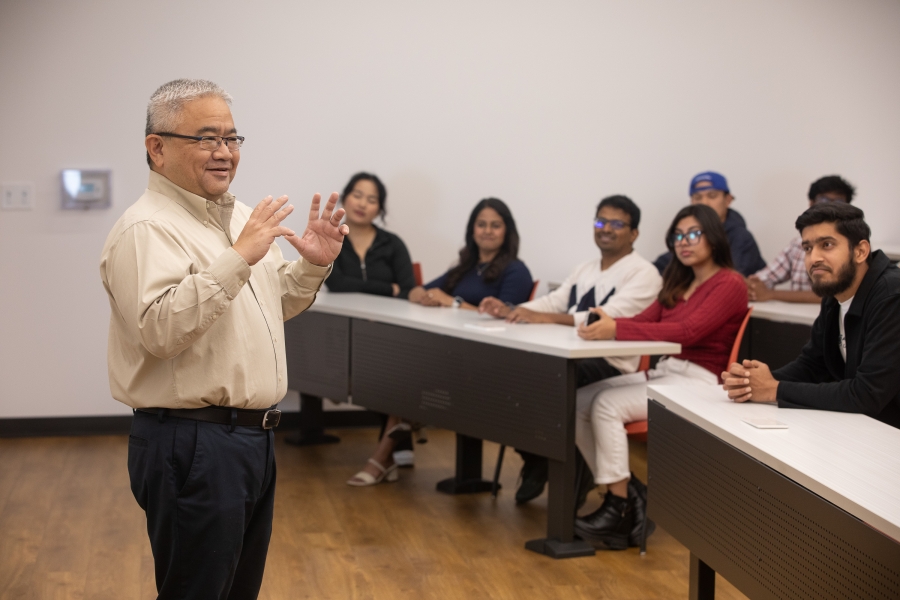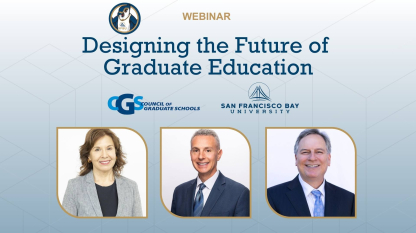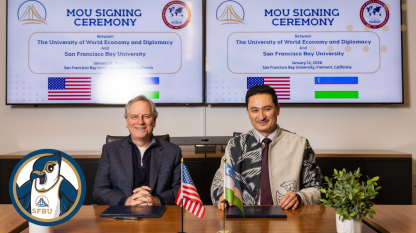
Dr. Thawi Iwagoshi, a familiar face at San Francisco Bay University, has taken on an exciting new role as the University’s new associate provost.
Iwagoshi’s journey with SFBU began shortly after earning his Ph.D. from The Ohio State University and relocating to California 25 years ago. His first role at SFBU was as an instructor teaching computer science courses, where he quickly established himself as a dedicated and knowledgeable educator.
After his initial tenure at SFBU, Iwagoshi transitioned to the tech industry, working as a software engineer at HP and building a tech startup. In 2014, Iwagoshi returned to SFBU to resume his teaching career, rekindling his passion for education. Just three years later, in 2017, he was promoted to dean of the School of Engineering, where he led efforts to support SFBU’s accreditation with the WASC Senior College and University Commission (WSCUC), a pivotal achievement for the institution.
“SFBU holds a special place in my heart, as it represents not just a workplace, but a community dedicated to transforming lives through education. I am deeply honored to continue working with this incredible team of highly dedicated individuals who share a passion for excellence and innovation,” said Iwagoshi. “Together, we are working to progress SFBU toward becoming a renowned university that continues to serve and inspire students from diverse backgrounds. My diverse experiences in academia, industry and entrepreneurship have equipped me with the skills and perspective to help SFBU grow, thrive and make a meaningful impact on our students and community.”
Below is a Q&A with Iwagoshi about his vision and his top priorities for SFBU’s future, edited for length.
***
Q: What are your priorities for academic programs at SFBU?
A: My priorities are centered around innovation, relevance and student success, with a clear focus on working with our team to position SFBU as a challenger brand that breaks the mold of traditional higher education. We want to make education more accessible and earning a degree more realistic for a diverse range of students.
First, we aim to prioritize the development of programs in emerging fields that are at the forefront of industry evolution, and offering students access to cutting-edge knowledge will equip them with the skills needed to excel in a rapidly changing workforce. We want to reduce the time students spend earning an undergraduate degree while preserving the quality of education they receive.
Second, we want to support the direction that positions SFBU as a university that challenges conventional higher education by ensuring our academic offerings remain relevant and responsive to market needs and societal demands. SFBU’s redesigned core curriculum will play a pivotal role in transforming general education by offering courses that are practical, innovative and designed to equip students with the essential skills to succeed both in the workplace and in life. By focusing on skills like critical thinking, problem-solving and adaptability, we can ensure our students are prepared for the challenges and opportunities of the future.
Finally, we are committed to offering academic programs that foster student success by providing tailored advising, experiential learning opportunities and robust academic resources to help students navigate their educational journey. This includes continuously evolving our curricula, building strong industry partnerships and integrating practical, real-world applications into our programs.
Q: How do you plan to integrate technology and innovation into SFBU’s academic offerings?
A: Our plan revolves around embracing state-of-the-art tools and preparing students to thrive in the age of AI.
We aim to incorporate AI into various aspects of teaching and learning. This includes using AI-driven tools to enhance personalized learning experiences, streamline administrative processes and provide on-demand tutoring with real-time feedback to students. By embedding AI into our pedagogy, we can create a more dynamic and adaptive educational environment that meets the unique needs of every learner.
Students will be educated on how to adapt to and leverage AI in their professional and personal lives. This involves not only teaching them how to use AI tools effectively to improve productivity and innovation but also fostering critical thinking skills to navigate the ethical and societal implications of AI.Additionally, we want to explore opportunities for SFBU to collaborate with industry partners to develop courses and certifications that align with the evolving demands of the workforce.
Q: How do you plan to support faculty development and foster innovation in teaching and research?
A: We have been working closely with the Center for Empowerment and Pedagogical Innovation (CEPI) at SFBU to create a robust faculty development program that focuses on enhancing teaching skills, promoting innovative teaching practices and encouraging the use of technology in the classroom. This includes workshops and access to resources that help faculty explore new pedagogical approaches, such as flipped classrooms, active learning and AI-powered tools. By supporting faculty in their professional growth, we can ensure that they are equipped to deliver dynamic, engaging and effective courses that meet the diverse needs of our students.
Fostering a culture of research and innovation is also essential. We aim to provide faculty with the necessary support to engage in meaningful research and scholarly activities. This could involve securing funding for research projects, creating collaborative spaces for interdisciplinary work and offering time and resources for faculty to pursue their research interests. We also believe in facilitating connections between faculty and industry leaders to ensure research remains relevant and impactful.
We want to build a collaborative environment that encourages cross-disciplinary partnerships, allowing faculty to share ideas and work together with students on innovative projects. This allows us to drive innovation in teaching and research, ultimately enhancing the academic experience for both faculty and students.
Q: How will you work to enhance the student experience at SFBU, both academically and beyond the classroom?
A: I believe that a truly impactful educational experience goes beyond just coursework. It involves creating a holistic environment where students are supported, challenged and inspired to grow in all aspects of their lives.
Academically, we plan to ensure that students have access to innovative, engaging and relevant courses that align with their career goals and equip them with the skills needed for success in the workforce. This includes integrating advance technologies, fostering experiential learning opportunities like internships, research projects and community engagement, and providing strong academic advising to guide students through their academic journey.
Beyond the classroom, I will work with our team to build a campus culture that supports students’ personal and professional development. This includes enhancing extracurricular activities, such as student clubs, leadership programs and networking opportunities with industry professionals. We will collaborate with our mental health and wellness programs to ensure students have the support they need to thrive emotionally and academically.
Additionally, we will team up with career services to connect students with internships, job opportunities and mentorship programs that will help them build valuable professional networks and succeed after graduation. Encouraging students to participate in intercollegiate competitions, conferences and publications will also be a key component of building their confidence and expanding their horizons. I believe we can create a vibrant, supportive environment where students can thrive.
Q: What advice do you have for students looking to make the most of their time at SFBU?
A: My advice is for students to remain focused on their studies while actively seeking assistance and guidance from their professors. Building strong relationships with faculty can provide valuable insights and support to help them succeed academically and professionally.
I encourage students to research the skills and expertise required in their desired career paths and strategically plan their courses to align with those goals. This proactive approach ensures they gain relevant knowledge and are well-prepared for the demands of their chosen industries.
Additionally, students should prioritize developing strong problem-solving skills through hands-on projects, case studies and real-world applications. These skills are critical in today’s dynamic job market. Finally, networking with industry professionals can open doors to new perspectives, valuable connections and career opportunities.


